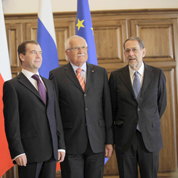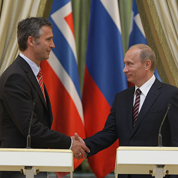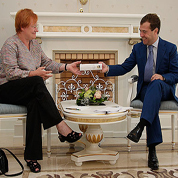Mob mentality hamstringing West’s deeper cooperation with Russia

How can this ‘bizarre statement’ be characterized and/or explained — a manifestation of acute political myopia by Biden, constant exertion of pressure on potential negotiations partner that is justified by geopolitical expediency or can all this fall under the traditional explanations of failures of new presidential administrations, where ‘the right hand does not know what the left hand is doing’? The most intriguing aspect is the fact that one cannot explain all these absurdities with the absence of normal communication channels and direct contacts between Russia and the West. It is, indeed, quite the contrary. In fact, to say that the level of political contacts between Moscow and the West is below par will be totally incorrect, as a quick check on the number of the high-profile visits by western politicians to Russia will reveal a high level of intensive diplomatic activities between the West and Kremlin.
This is evident in the recent visits by Finnish President Tarja Halonen and German Chancellor Angela Merkel in August. In fact, a more thorough stock review of top foreign political dignitaries’ visits to Russia in the past 12 months alone will reveal that most of the G8 countries leaders had either personally visited or sent high-profile delegations to Moscow, with the notable exceptions of the UK and Canada. However, these other leaders have also met with the Russian president at various international meetings, notably, at the G20 Summit in London and the G8 gathering in Italy’s L’Aquila. Similarly, heads of most of EU member-states, with the notable exceptions of the so-called ‘New European states,’ the term coined by the hawkish ex-U.S. vice president, Dick Cheney, for the former communist countries in Eastern and Central Europe, which are often blinded by their traditional anti-Russia mindsets, have also been regular visitors to Russia. Indeed, some — such as Merkel, French President Nikolas Sarkozy and European Commission President Jose Manuel Barroso — have actually been, at least, more than once in Russia during this period, either as parts of larger intergovernmental delegations or on separate visits.
Also a review of some of the official statements — made either as joint policy declarations or individual pronouncements and/or answers to press questions on issues of regional and international importance during the traditional press conferences accompanying such visits — has similarly revealed that these  western leaders have often repeated that there are “no absolutely irresolvable differences” on key strategic issues that could derail much deeper cooperation with Moscow on all major geopolitical issues, from energy, global security, Middle East regulation and international terrorism to other pressing problems and challenges of global importance demanding urgent solutions today.
western leaders have often repeated that there are “no absolutely irresolvable differences” on key strategic issues that could derail much deeper cooperation with Moscow on all major geopolitical issues, from energy, global security, Middle East regulation and international terrorism to other pressing problems and challenges of global importance demanding urgent solutions today.
Naturally, western leaders, however, do voice their growing concerns over certain Russia’s domestic policy issues, such as human rights, supremacy of law, protection of foreign investors’ rights, etc., and also on certain foreign policy issues, notably, their non-acceptance of Moscow’s recent unilateral recognition of the independence of former Georgia’s republics of South Ossetia and Abkhazia. But the mentioning of these issues during such official trips are often seen as the visitors’ attempts to appease their more ‘radical domestic and international electorates’ anti-Russia sentiments rather than as practical policy statements aimed at really pressurizing the Kremlin into changing its positions on issues seen by Moscow as its ‘private policy strategies’ that cannot be influenced by outside forces.
This brings us to the ultimate question, which is how and why the strategic pledges of deeper cooperation made by these leaders have so far failed to yield more significant results in the partnership relationships between Russia and the entire West, as a single political and economic entity. The answers probably lie in the fact that as soon as these same western leaders gather either at their regular EU and NATO summits or at other purely western meetings in Washington, Brussels or any other western capitals, the overall tone of their joint strategic policy statements regarding Russia often turns radically vehement, at times, even bordering on the rims of the now-discarded hawkishly Cold-War-like rhetoric.
Indeed, acting as if totally ‘reborn’ or ‘transformed,’ the same leaders that have just vowed strategic cooperation with Moscow, often resort to blaming Russia for almost everything that has gone wrong on the continent in the past decade. The commonest standard charges range from the regular disruptions of energy supplies to European consumers at the height of winters, though the role of Russia here is always secondary to Ukraine’s inability to meet its gas transit obligations, to the Kremlin’s purported usage of its vast energy resources as ‘an instrument of geopolitical and economic pressure on its neighbors’ and Moscow’s allegedly non-cooperative stands on key issues seen in most western capitals as strategic to the realization of their individual or collective geopolitical interests and economic objectives on the global arena.
 This sudden radicalization of the West’s stance, often orchestrated at such summits by the leaders of the ‘New European’ states or their curators in ‘Old Europe’ and Washington, is seen by independent observers as a typical manifestation of the so-called ‘mob or crowd mentality behaviors’ in contemporary geopolitics. This term — first put forward by 19th century French social psychologists Gabriel Tarde and Gustav Le Bon — describes certain unique behavioral characteristics which emerge from the ways people act when they are in large groups, as opposed to the ways they would have acted under the same circumstances as separate individuals.
This sudden radicalization of the West’s stance, often orchestrated at such summits by the leaders of the ‘New European’ states or their curators in ‘Old Europe’ and Washington, is seen by independent observers as a typical manifestation of the so-called ‘mob or crowd mentality behaviors’ in contemporary geopolitics. This term — first put forward by 19th century French social psychologists Gabriel Tarde and Gustav Le Bon — describes certain unique behavioral characteristics which emerge from the ways people act when they are in large groups, as opposed to the ways they would have acted under the same circumstances as separate individuals.
This behavior really plays into the Kremlin’s hands, which, knowing this ‘specific idiosyncrasy’ among top western politicians, usually prefers to deal with western nations not as a united group, but on an individual basis. This is akin to the use of the famous ‘divide-and-rule’ strategy, because the Kremlin has long understood that it gains more by dealing directly with individual western countries, rather than dealing with them collectively as a united entity such as the EU or any of the transatlantic organizations such as the NATO, where the ‘mob mentality’ from nations with hidden, selfish political and economic agendas and overt anti-Moscow mindsets — often takes supremacy over common sense, political exigency and economic necessity in all decisions involving or relating to Russia.
It, therefore, goes without saying that the earlier the West discards this mob behavior in their relationships with Russia, the better will be for both their relationships, and by extrapolation, to the whole of the global community, as history has proved that the state of the relationships between the West and Russia often have critical impacts on geopolitics, and hence global security issues and the architecture of sustainable international peace and economic prosperity in the world.












 Web design,
Web design,